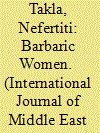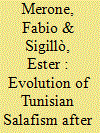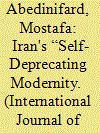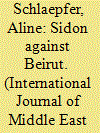|
|
|
Sort Order |
|
|
|
Items / Page
|
|
|
|
|
|
|
| Srl | Item |
| 1 |
ID:
181090


|
|
|
|
|
| Summary/Abstract |
This article analyzes the sensationalized media coverage of a serial murder case during the Egyptian revolution of the early interwar era. Despite conflicting evidence, the media blamed the murders on two sisters from southern Egypt named Raya and Sakina. Through a close reading of Egyptian editorials and news reports, I argue that middle-class nationalists constructed Raya and Sakina as barbaric women who threatened to pull the nation back in time in order to legitimize their claim to power. Borrowing from Ann Stoler's analysis of the relationship between race and sexuality and Maria Lugones's concept of the modern/colonial gender system, this article maintains that race was as central to nationalist conceptions of female barbarism as gender, sexuality, and class. The enduring depiction of Raya and Sakina as the quintessential barbaric Egyptian women symbolizes the way in which the modern woman was constructed at the intersection of race and sexuality.
|
|
|
|
|
|
|
|
|
|
|
|
|
|
|
|
| 2 |
ID:
181094


|
|
|
|
|
| Summary/Abstract |
What shape does Salafism take in Tunisia after the ban of the Salafi-Jihadi group Ansar al-Shari‘a and the wave of securitization carried out by national authorities? This article argues that a constraining legal context put Salafism's doctrinal rigidity in tension with its survival and ultimately prompted a residual current of Salafi actors to accommodate their stance toward Malikism, the prevalent school (madhhab) in the country. This adaptation is at odds with contemporary Salafism, which traditionally dismisses all four law schools (lā madhabiyya), rejects their blind imitation (taqlῑd), and claims the superiority of the Qur'an, hadith, and consensus of the salaf (pious predecessors) over jurisprudence (fiqh). To account for this puzzle, this article scrutinizes the historical development of Salafism and the evolution of its stance toward Malikism across three generational waves. It notably shows how religious securitization associated with the promotion of a “moderate” Islam pushed Salafi actors to redefine their ideology to preserve their preaching and teaching activities. We call Salafi-Malikism the outcome of this adaptive strategy. Drawing on the Tunisian case, we argue that, despite its purist claims, Salafism is not an immutable religious current, but can take different trajectories to survive in constraining environments.
|
|
|
|
|
|
|
|
|
|
|
|
|
|
|
|
| 3 |
ID:
181091


|
|
|
|
|
| Summary/Abstract |
Extant studies of Iranian nationalism accentuate the self-aggrandizing side of Iranian modernity, mainly achieved through, and informing, a process of otherizing certain non-Persians/Iranians, particularly the Arabs. I argue that equally important to understanding Iranian modernity is its lesser recognized, shameful and self-demeaning face, as manifested through a simultaneous 19th-century discourse, which I call “self-deprecating modernity.” This was an often self-ridiculing and shame-inducing, sometimes satirical, discourse featuring an emotion-driven and self-Orientalizing framework that developed out of many mid-nineteenth-century Iranian modernists’ obsessions with Europe's gaze; with self-surveillance; and with the perceived humiliation of Iranians through the ridiculing laughter of Other (especially European) nations at Iran's and Iranians’ expense. To explore this discourse, I re-examine the works of three pre-constitutionalist thinkers and writers within the broader sociopolitical context of late Qajar Iran, surveying their perspectives on shame, embarrassment, and ridiculing laughter, and showing how they were significantly informed by, while also helping to form, self-deprecating modernity. Given the strong, self-colonizing presumptions of this discourse, I conclude the article with a stress on the importance of re-exploring collective self-critical practices in modern Iranian history, culture, and literature with an eye toward decolonizing self-criticism.
|
|
|
|
|
|
|
|
|
|
|
|
|
|
|
|
| 4 |
ID:
181093


|
|
|
|
|
| Summary/Abstract |
This paper aims to clarify the scope and limitations of the ideals of Pan-Maghrib nationalism as developed by the Association of North African Muslim Students in France (AEMNAF) in the 1930s. The AEMNAF members’ inclination toward sciences and technology and their emphasis on conserving their mother culture made them consider Arabism and Islam their most important identity markers. Moreover, the AEMNAF created a sense of solidarity among Maghribi students in France and extended its social influence by cooperating with French and Mashriqi opinion leaders in Europe. However, the AEMNAF's narrow definition of Muslim-ness and its elitist nature led to the exclusion of Maghribis with French citizenship from the organization. The dualistic view of technology and culture in Maghribi nationalist thought also contributed to prioritizing Francophones over Arabophones, Muslims over non-Muslims, men over women, and students in the sciences over those in humanities.
|
|
|
|
|
|
|
|
|
|
|
|
|
|
|
|
| 5 |
ID:
181092


|
|
|
|
|
| Summary/Abstract |
When the State of Greater Lebanon was established in 1920, the Jewish Community Council of Beirut was officially recognized as the central administrative body within Lebanon, and although smaller communities such as Sidon and Tripoli also had their own councils they were consequently made subject to the authority of Beirut. In this context of political overhaul, I argue that some Jewish actors made use “from below” of political opportunities provided by sectarianism “from above”—or national sectarianism—to garner control over all Jewish political structures in Lebanon. But by examining in particular activities in and around the Israelite Community Council in Sidon (al-Majlis al-Milli al-Isra'ili bi-Sayda), I show how and why these attempts to practice new forms of sectarianism were met with resistance, despite connections that tied Lebanon's Jews together administratively in one community.
|
|
|
|
|
|
|
|
|
|
|
|
|
|
|
|
| 6 |
ID:
181089


|
|
|
|
|
| Summary/Abstract |
This article uses ethnography of a studio recording project underway at a Qur'anic school in Salé, Morocco, to offer new insight on sound, media, and religious authority in Islamic contexts. The aim of the project is to record the entire Qur'an incorporating all of its seven canonical, variant readings (qirā’āt), which are enjoying a small renaissance in Morocco. Several of the school's faculty, known as shaykhs, engaged as expert listeners and overseers of the process. I show how a historical model of such expert listenership, which I call “aural authority,” is transformed by the technologies of the studio and then dispersed across a collective of productive agents that includes the reciter and the sound engineer. I argue that these transformations, along with erasure of the shaykh's role from the medium of circulation—the recording—presents significant challenges to the broader qirā’āt tradition and raises questions about its future.
|
|
|
|
|
|
|
|
|
|
|
|
|
|
|
|
|
|
|
|
|